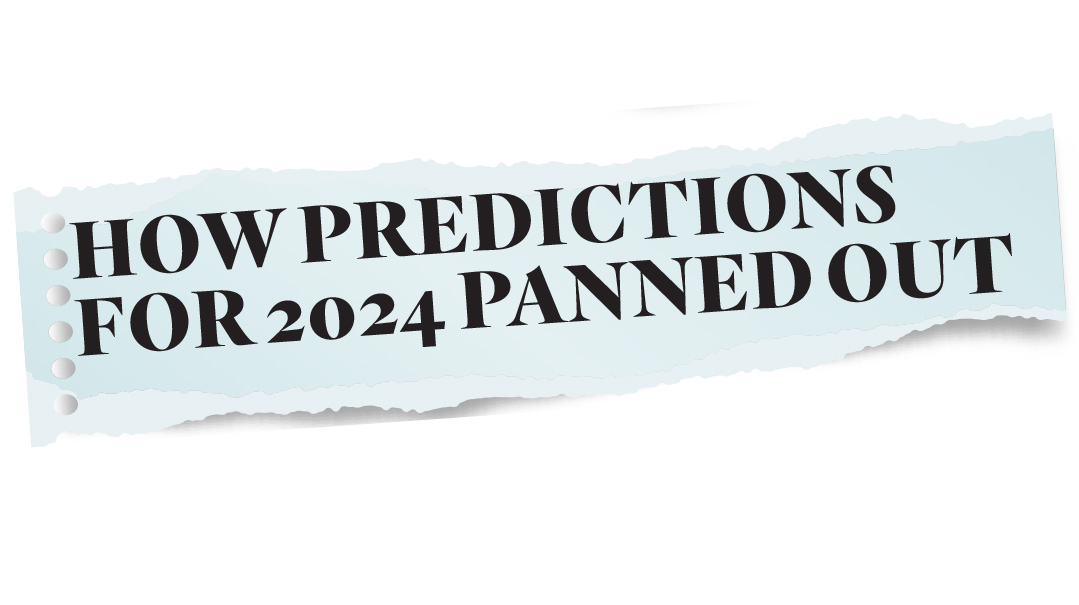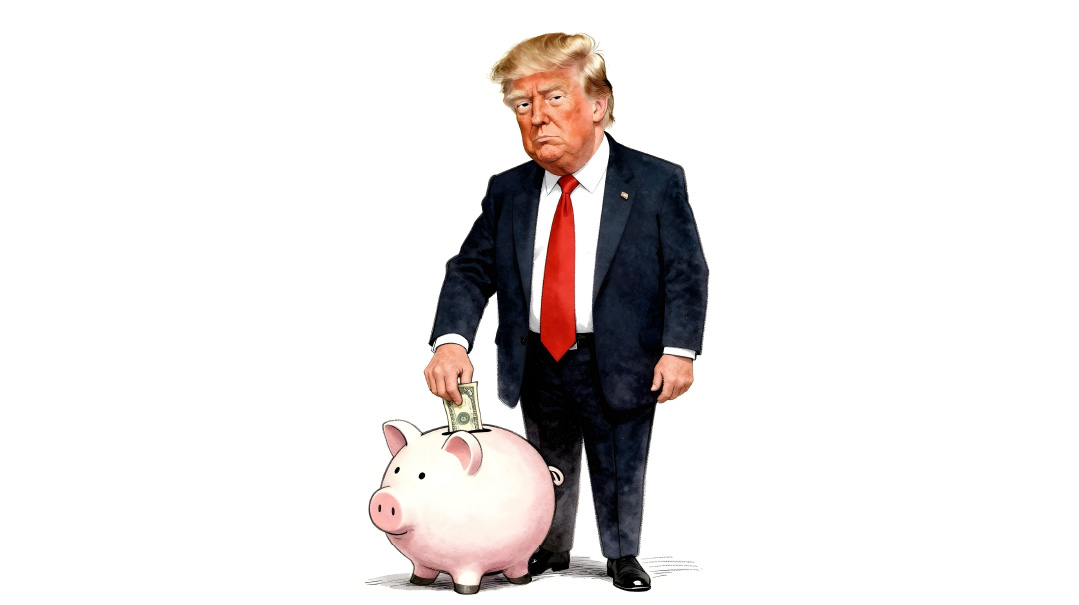How Predictions for 2024 Panned Out
| December 31, 2024Every year, prominent public figures are prepared to put their credibility on the line by forecasting the future

Prediction is a risky business, yet every year, prominent public figures are prepared to put their credibility on the line by forecasting the future. As British prime minister Harold Macmillan said, the most difficult thing about his job was events.
Who could have predicted the wild turns the US election took, the collapse of Europe’s two strongest governments in France and Germany, or the rapid fall of the half-century-old Assad regime in Syria? Still, as 2024 began a year ago, plenty of vaunted institutions and commentators recorded for posterity their predictions for a truly memorable 12 months. We look back at some of them to see how they actually turned out.
President Joe Biden will beat Donald Trump in the November election, and Vice President Kamala Harris will play a huge role.
—An op-ed in The Hill, January 1, 2024
What happened:
Biden didn’t even run, dropping out of the race in July after a disastrous debate that exposed his cognitive decline. Kamala Harris was coronated as the nominee, but she was soundly trounced by a resurgent Trump, who won the Electoral College, popular vote, and both houses of Congress.
What it means:
The commentariat indulged in wishful thinking when it came to the outcome of the US election, right up until the results came in — though to be fair, Biden and the Democrats started out 2024 in a relatively strong position. Few people could have foreseen the jaw-dropping debate that forced Biden to exit and be replaced with the underwhelming, over-hyped Harris.
Biden won’t pardon his son Hunter.
—Former CNN journalist John Harwood
What happened:
In early December, the outgoing US president issued a presidential pardon for his son Hunter, who’s embroiled in criminal suits over his tax affairs, as well as a gun case. Biden and his aides had repeatedly insisted he wouldn’t use his privileged position to let his son off the hook.
What it means:
Biden’s screeching U-turn is a humiliation for the progressive movement at large, which constantly contrasted its own perceived ethical standards with Trump’s unabashed nepotism and self-indulgence. It gives Trump far more leeway in his second term; he can rebut any moral protest from the Democrats by just pointing them toward Biden’s self-serving hypocrisy.
“Socio-politically, [Argentinian president Javier] Milei is a risk, with his blunt opinions on [matters such as] abortion and climate change putting Argentina at an increased risk of civil dissent.”
—Inquire Publication, a university magazine
What happened:
Milei has implemented radical reforms that have helped tame his country’s hyperinflation and soaring debt. The measures have faced some opposition, but his approval ratings are climbing, and now stand at 54%, the highest during his tenure. The public is hardly rioting in the streets over social issues.
What it means:
So far, Milei’s “chainsaw economics,” a ruthless axing of bureaucracy and regulation, appear to be working. Inflation is down and economic confidence has risen throughout the year. As evidenced in elections all over the world in 2024, it was the economy, stupid.
France’s far-right National Rally (RN) is projected to win a snap election without an absolute majority.
—Reuters
What happened:
In a shock defeat, Marine Le Pen’s RN party slumped to third place, behind a left-wing alliance and President Emmanuel Macron’s centrist camp.
What it means:
Though National Rally dominated in the polls and had a good result at the European Parliament elections in May, the centrist and left-wing coalitions effectively united, through pacts in individual seats, to block RN candidates coming through the middle. As of the end of 2024, though, Macron is on his fifth prime minister of the year, and his government is effectively paralyzed.
Sustainability was high on the corporate agenda in 2023, and will continue to be in 2024.
—London Business School
What happened:
Amid a backlash from voters, governments backtracked on green commitments, and businesses followed suit, ceasing to trumpet their green credentials for fear of turning off consumers. Notable examples include tractor supply company John Deere, Jack Daniels, Black and Decker, and the world’s largest company by revenue, Walmart.
What it means:
As long as consumers struggle with the cost of living and rebel against being preached at by an overpaid managerial class, businesses will continue to protect their bottom lines above all else. Expect scientists’ and NGOs’ warnings to go unheeded by risk-averse businesses who know their customers care more about their pockets than pronouncements about the planet.
Germany’s economy will grow by 0.3% in 2024.
—The German government
What happened:
The German economy is projected to have contracted by 0.2%, according to its central bank.
What it means:
Germany’s economy underperformed even the most modest of expectations for the former engine of Europe, driven by a sharp decline in auto exports. The industry blames a drop in Chinese demand, coupled with onerous environmental regulations and targets. The flagging economy is Chancellor Olaf Scholz’s biggest headache as he leads his party into snap elections in February 2025, which he’s expected to lose badly.
Israel’s Prime Minister Binyamin Netanyahu is toast. He was in trouble before October 7; he’s in more trouble now.
—Toronto Sun
What happened:
A series of military successes and high-profile assassinations throughout the year have boosted Bibi’s ratings. A mid-December poll showed the Likud netting the largest number of seats if an election were held today.
What it means:
Bibi’s problems are far from over. He faces legal troubles, internal spats over religious issues and judicial reform, and the war in Gaza grinds on, with an ever-dwindling number of surviving hostages still in captivity. But the past year has proven that reports of Netanyahu’s political demise are, once again, greatly exaggerated.
“Syria’s president, Bashar al-Assad, is secure in his position, and we do not expect any regime change in 2024–28.”
—The Economist
What happened:
Assad’s tyrannical regime fell in less than two weeks. The army did little to stop a rebel surge and willingly abandoned their weapons and uniforms once Assad had fled to Moscow.
What it means:
In hindsight, there’s much talk of the hollowing out of Russian and Iranian military capabilities, which left Assad to face the rebels alone. But for some reason, no one was pointing to these factors until the coup began in late November. The world is still coming to terms with Assad’s dizzying fall, and waiting to see how the new government behaves, but the astonishing events have provided much humble pie for foreign policy experts, none of whom saw it coming.
(Originally featured in Mishpacha, Issue 1943)
Oops! We could not locate your form.







